Posts Tagged ‘Globalisation’
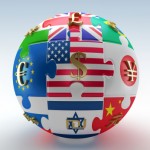
This article contains application of Dunning Eclectic Paradigm on the case study of Shanghai Vision Technology Co., Ltd, a medium sized manufacturer of 3D printers and other innovative products based in Shanghai, China. Exporting can be specified as the most appropriate new market entry strategy for Shanghai Vision Technology during the early stages of internationalisation. Exporting new market entry strategy can be explained a greater depth using Dunning Eclectic Paradigm (DEP) that relies upon three types of advantages – ownership, location and internationalisation advantages. Ownership advantages The choice of exporting as new market entry strategy grants Shanghai Vision Technology the complete ownership advantage of all components of marketing mix. In other words, by choosing exporting the company retains complete freedom in terms of introducing changes to pricing, product specifications, distribution channels and promotion initiatives. Location advantages Ownership and internationalisation advantages to be derived by Shanghai Vision Technology due to the selection of exporting new market entry strategy is going to be facilitated at the expense of location advantages. Specifically, by exporting its products to new markets Shanghai Vision Technology would not possess location advantages with negative implications such as being disadvantaged from tariff barriers and higher transportation costs compared to local businesses. Internationalisation advantages Internationalisation advantages within Dunning Eclectic Paradigm relates to cost advantages that are gained through organising operations within geographical boundaries of new markets. Positive impact of internationalisation to Shanghai Vision Technology is limited during the first stage of international market expansion strategy due to the recommended choice of exporting new market entry strategy. Nevertheless, this specific type of advantage may become available to Shanghai Vision Technology during the later stages of Uppsala model described above once the company establishes sales subsidiaries and production unit abroad.

With the increasing forces of globalisation the need for trade regulation in an unbiased and objective manner increases. This role has been assumed by World Trade Organisation (WTO) and its functions include administration of trade agreements, serving as a forum for trade negotiations, dealing with trade disputes between its members, and monitoring policies of its members related to trade. Established in January 1, 1995, WTO comprises 159 members and it is based in Geneva, Switzerland (Annual Report, 2013). There are contradicting assessments of WTO performance in terms of regulating trade between counties in an effective manner. You can read more scope, contribution and criticism related to WTO here. On one hand, WTO has been praised for such positive impacts as stimulating economic growth and increasing the level of employment, encouraging good governance practices, contributing to peace and stability and settling trade disputes amongst its members (Ahern and Fergusson, 2010). On the other hand, WTO critics argue that the organisation has made a counter-productive impact on development of a range of its members, and it also has been blamed for neglecting environmental issues. Moreover, WTO has been criticised on the grounds of political bias for serving as an instrument at the hands of its few hegemonic members. Moreover, there are other international organisations which are parts of United Nations Organisations (UN) such as World Bank, and International Monetary Fund (IMF), that have certain impacts in international trade practices. UN in general, and its Economic and Social Council in particular can be specified as another international organisation that does have impact on trade regulation between countries. Comprising 54 members for three-year terms, the Economic and Social Council aims to promote international cooperation in order to achieve economic and social development. Millennium Development Goals is one of the most noteworthy economic initiatives proposed…

In line with the advantages of free trade discussed here, there is a set of objections to free and these objections can be represented through the following four points. Firstly, free trade is criticised due to its perceived disadvantages to local producers. The concept of free trade promotes open competition without barriers in the global scale. Thus, companies from abroad with strong competitive edge may present serious threat to the levels of revenues of local businesses. However, this threat can be used as a positive factor as well, in terms of motivating local producers to innovate and search for additional sources of competitive edge in creative ways. From this perspective, local producers need to be assisted by government through building effective infrastructure for competition rather than being protected from foreign competitors limiting their motivation to innovate. Secondly, free trade is blamed for causing trade deficits with detrimental impacts on national economy. Specifically, trade deficit is an absence of balance between imports and exports and reducing the levels of trade deficits is one the main macroeconomic goals of the government. Trade deficit between US and China has been estimated to be as much as USD 40.6 billion (Crutsinger, 2014, online), and a range of economists point to this number as one of the main reasons for severe economic issues in the US. At the same time, counter-argument can be formulated in a way that “a growing trade deficit, despite its misleading name, is a good for the economy. It is typically a signal that global investors are confident in America’s future” (Boudreaux, 2014, online). In other words, there is a positive correlation between trade deficit and the levels of investment in the national economy from abroad, and these investments have great potential to revive national economy. Thirdly, free trade is criticised for…
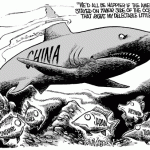
Free trade can be defined as “a policy by which a government does not discriminate against imports or interfere with exports by applying tariffs (to imports) or subsidies (to exports)” (Britannica, 2014, online). In simple terms, free trade can be explained as an absence of government intervention to the practices of selling to and buying from another country. Promoted by famous economist Adam Smith and David Ricardo, perceived advantages of free trade include benefits to be gained from specialisation practices engaged by countries according to their competitive advantages. This benefit based on theoretical frameworks of absolute advantage and comparative advantage. Specifically, according to the theory of absolute advantage proposed by Smith (1976), countries are perceived to have absolute advantage in producing a product if the production is facilitated in the most efficient way than other countries. Comparative advantage proposed by Ricardo (1817), on the other hand, refers to “the ability to produce a specific product more efficiently than any other product” (Pride et al., 2011, p.70). According to theories of absolute advantage and comparative advantage focus on manufacturing products that can be produced more efficiently than other countries and trading these products for other products with different countries generates more economic gain and value compared to attempts to diversify production within a single country. A basic classical example of trade of two products between two countries found in the most economics textbooks illustrate the advantage of free trade in the most effective manner. Moreover, free trade encourages competition in the market, motivating local producers to find and utilise sources for competitive edge on a constant basis, and high level of competition in the market offers benefits to consumers in terms of more variety of products and services, higher quality, and competitive prices. Another advantage of free trade can be specified…
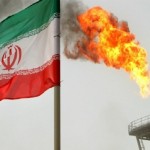
Iran was the first state in the Persian Gulf to find oil in 1908, and since 1920s petroleum has served as the main industry in Iran. There is a general consensus in the literature that the overthrow of the Shah of Iran and the revolution in Iran in 1977 came as a great surprise to many individual and organisational observers. This revolution has been political, as well as, cultural. Increasing levels of rentierism in Iran under the rule of Shah, at the same time when neglecting the needs and concerns of ordinary people can be specified as one of the major factors contributing to the emergence of revolution. Specifically, it has been noted that “after the mid-1960s, this state did not need to wrest taxes from its own people, and the economic basis of its revenues was an industry oriented primarily to exports, and employing only a tiny percentage of the domestic labour force” (Skocpol, 1994, p.244). However, it can be argued that the level of rentierism in Iran has changed only a little after the revolution due to a range of reasons such as high levels of corruption, leadership incompetence, and lack of motivation from the government leadership. Moreover, Gordon et al. (2008) assess the average degree of rentierism in Iran for the period between 1972 and 1999 to be 55 per cent. According to Gordon et al. (2008) rentierism has been causing deep economic structural weaknesses in Iran and this along with political uncertainty and environmental vulnerabilities represent complex challenges for Iran in short-term and long-term perspectives. Negative implications of rentierism are also noted by Duero (2009), who links rentierism in Iran to the issues of unemployment and underemployment, demographic problems and the issues associated with patterns of energy production and consumption. It has been assessed that government’s…
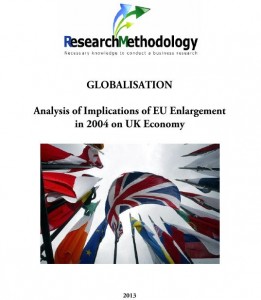
On May 1, 2004 the European Union (UN) has been enlarged to comprise additional ten countries with combined population of almost 75 million people. Specifically, new countries that formally entered EU consist of Estonia, Latvia, Lithuania, Poland, Czech Republic, Hungary, Slovakia, Slovenia, Cyprus and Malta. This important geo-political event has had significant implications on national economic, social and political life of all original member countries of the EU (Europa, 2013, online).This essay analyses the impacts of EU enlargement on the state of national economy in the UK focusing on labour migration. The essay starts with discussions about the reasons for the enlargement of EU in 2004. This is followed by analysis of implications of enlargement of EU to the state of national economy in the UK as compared to expectations. Moreover, the essay is going comprises the overview of measures initiated by the UK government in order to address the potential negative implications of the EU enlargement on the state of the national economy in the UK. The essay is concluded by discussing various scenarios in the development of immigration policies in the UK with the aims of protecting national economy from negative impact of a range of internal and external factors. After the fifth EU enlargement in 2004, the majority of Western European countries (EU15) have introduced temporary restrictions on the movement of individuals from newly EU member states in order to protect their national economies from the large uncontrolled inflow of low-skilled immigrants. Such restrictions were not applied only by the UK, Ireland, and Sweden (Longhi and Rokicka, 2012), and the implications of this government decision for the UK are assessed further below. Introduction 1 Reasons for the enlargement of EU in 2004 2 Implications of enlargement of EU to the state of national economy in the UK…
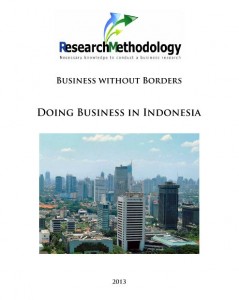
The report starts with the identification of gap in the knowledge about doing business in emerging markets in general, and Indonesia in particular. This is followed by providing recommendations to managers in relation to dealing with specific issues and practices they are likely to be faced with in Indonesia. The report is concluded by providing a summary of the key points of the research and mentioning the key points of advice. International market expansion opportunities for businesses enabled by intensive economic globalisation during the last several decades have increased the numbers of international assignment for managers at top levels. Importantly, “international managers need to have a clear view of where they want their firm to be in the future; they have to organise to implement their plans; they have to motivate those who work for them; and they have to develop appropriate control mechanisms” (Griffin, 2010, p.161). However, implementation of all of these tasks in practical levels is associated with a set of significant difficulties that relate to cross-cultural differences, family adjustment issues in a new country, language adaptation challenges and others. This report advises managers seeking to work in an emerging market on management practices in an international and cross-cultural context focusing on Indonesian consumer electronics market. The main reasons for the choice of Indonesia as an emerging market to be discussed in this report relates to the importance of Indonesia Investment Guarantee Fund – the best practice guarantee facility for investors and the potential possessed by Indonesia to become the next member of BRIC (Wagner, 2012, online) with positive implications on the performance of businesses operating in this country. 1. Introduction 1 2. Identification of Gaps in Knowledge 2 3. Recommendations Regarding Issues and Practices in Indonesia 4 3.1 Cross-Cultural Differences 4 3.1.1 National culture 4 3.1.2 Organisational…

Global forces impacting UK businesses include, but not limited to increasing scale of international trade, increasing levels of multiculturalism in UK organisations, increasing levels of inter-dependency of national economies and others. The impact of global forces on UK Business Organisations can be effectively analysed using PESTEL analysis where the abbreviation stands for political, economical, social, technological, ecological, and legal factors impacting businesses. The following table contains the application of PESTEL analysis in relation to businesses operating in the UK. Political The level of global political stability The level of bureaucracy in international affairs The extent of freedom of media Global trade control initiatives Threat of international terrorism Tariffs between the UK and other countries Global copyright, patent and intellectual property disputes Economical Impacts of intensifying economic globalisation Global economic crisis Sock market fluctuations Cost advantages possessed by emerging superpowers such as China, India etc. Impact of The World Bank and The World Trade Organisation Increasing importance of outsourcing and offshoring initiatives Social Changes in family values in global scale Changes in family patterns (same-sex marriages, single parents etc.) Increasing popularity of immigration and migration practices Increasing mobility between social classes Greater concern for minorities in society Technological Level of global technological infrastructure Industry-specific technological breakthroughs Regular emergence of innovative communication technologies Adoption of technology as competitive edge by increasing numbers of businesses Ecological Impacts of global warming tendencies Increasing levels of air and pollution Increasing level of sensitivity towards “green” problems among business stakeholders Activities and initiatives of global environmental organisations Legal Laws and regulations related to data protection Global data protection rules and regulations Increasing levels of “legal globalisation” Changes in cross-country employment and health and safety laws The case studies of Martin Lishman and Aquaco mentioned above represent a few cases where UK businesses benefit from…

International trade is the exchange of capital, products and services across borders. Advantages of international trade include greater utilisation of resources, importing products that can not be produced locally, and increasing the variety of choice to consumers. However, international trade may be associated with disadvantages as well such as loss of local jobs and high level of dependency on foreign markets. Significance of international trade to UK business organisations can be explained by referring to the concept of comparative advantage. According to the concept trade between two countries can be made in a mutually beneficial manner, if each country has comparative advantage to manufacture products to be traded. One of the leading English economists of the 19th century David Ricardo uses the cases of England and Portugal producing cloth and wine as it is presented in Table 2. According to Table 2, England possesses relative advantage in producing cloth as it less labour hours are required. Portugal, on the other hand, has relative advantage in wine production, because only 80 hours are required to produce wine as compared to 90 hours to produce cloth. Cloth Wine Ratio of price of wine to the price of cloth Ratio of price of cloth to the price of wine England 100 120 1.20 0.83 Portugal 90 80 0.88 1.12 Illustration of the concept of comparative advantage Source: Hunt and Lautzenheizer (2011) In other words, England can produce each unit of cloth for lower prices compared to wine, while for Portugal it is cheaper to produce each unit of wine than producing each unit of cloth. Accordingly, both England and Portugal can consumer maximum amounts of cloth and wine if they focus on producing products within their relative advantage, and engage in international trade. Impact of international trade to UK businesses can be illustrated…
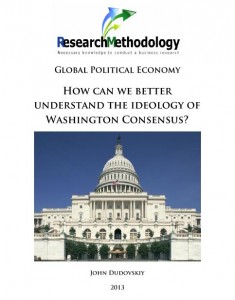
This paper critically analyses the ideology of Washington Consensus. The paper starts with discussions about factors and circumstances that have caused the emergence of Washington Consensus. This is followed by discussing positive implications of Washington Consensus for certain countries by referring to relevant facts. Moreover, the paper highlights major points of criticism of Washington Consensus and the attempts to assess the level of their validity of these points and discusses reasons and circumstances for introduction of Post-Washington Consensus also known as Washington Consensus II. The paper is completed by attempting to the future of Washington Consensus prescriptions in modern dynamic global geo-political environment. There always have been disparities between countries in terms of the levels of economic developments and this tendency is most likely to continue in the future. However, there have been attempts by highly developed countries to assist the level of economic development of developing countries through various programs involving financial aids and recommendations. A set of policy recommendations proposed by the US to developing countries has been known as Washington Consensus, and there are mixed opinions about the implementation and outcome of these recommendations (Bandelj and Sowers, 2010). Introduction 1 Emergence of Washington Consensus 1 Potential Positive Implications of Washington Consensus 4 Criticism of Washington Consensus and the Level of their Validity 6 Washington Consensus II and the Level of its Effectiveness 10 The Future of Washington Consensus 11 Conclusions 14 References 16 International Monetary Fund World Trade Organisation World Bank How do I receive the report? Once payment is made you will receive a link to you e-mail you have registered with on Pay Pal or the e-email you have entered when specifying bank details to download the report. The report is downloaded in PDF format. The link will stay active for 7 days. How can…
